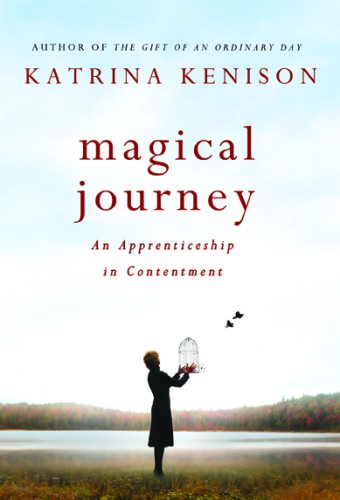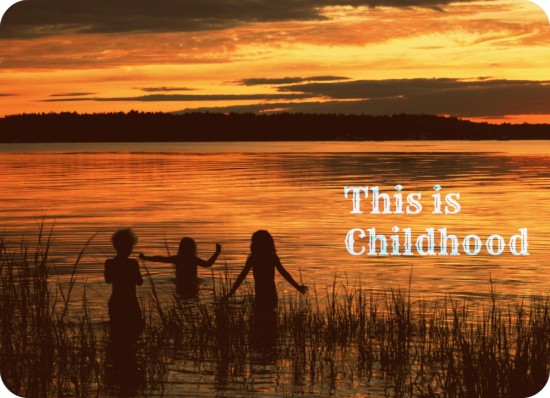At the end of this review, see details about how to win a signed copy!

To say that I was excited to read Katrina Kenison’s new book, Magical Journey: An Apprenticeship in Contentment, is an almost ridiculous understatement. I read The Gift of an Ordinary Day a couple of years ago in one breathless gulp, astonished to have found someone whose writing so closely – albeit more beautifully and more eloquently – mirrored the contents of my own heart and spirit. Quickly, I read Katrina’s first book, Mitten Strings from God, which moved me as well. And then, in a twist of events that reminded me of how benevolent this universe can be, I bumped into Katrina at a coffee shop less than a mile from my house. Although we had never met, we recognized each other immediately. After that, we began corresponding, and I am now privileged and honored to call Katrina a teacher, a mentor, and a friend.
Reading Katrina’s writing is a unique experience for me. It feels like a call and response chant with my own thoughts. In her trademark sensitive, lambent prose, Katrina touches on things, topics, and feelings that are among my most fiercely-believed, deeply-buried, and profoundly-felt. Many times as I read Magical Journey I gasped audibly, when I read lines from my very favorite poem or the description of a sentiment I know so well it feels like it beats in my own chest. Perhaps most of all, Katrina and I share the same preoccupation with impermanence; our spirits circle around a similar wound, which has to do with how quickly this life flies by, and with how irreplaceable these days are. Both The Gift of an Ordinary Day and Magical Journey are suffused with a bittersweet awareness of time’s passage that is keenly, almost uncomfortably familiar to me.
Magical Journey opens with enormous twin losses: Katrina’s sons have both left the house (her older son to college, and her younger son to boarding school) and soon thereafter one of her dearest friends dies after a multi-year battle with cancer. These two events form a cloud that stands between Katrina and the sun, and the book takes place in their shadow. Magical Journey is Katrina’s reckoning with life on the other side of these two farewells, and with entering the “afternoon of life,” when she is “aware as never before that our time here is finite.”
Though different, each of the losses that Katrina experiences are both irrevocable and life-altering. I related to both. I read about Katrina grieving the years when her children lived at home with tears running down my face. She describes the particular, poignant reality of life with small children at home and I weep, because while I am in those years, right now, I am already mourning them. No matter how I avert my gaze, I can’t stop staring at the bald truth that these days are numbered; I cry daily for the loss of the days I am still living.
At times my nostalgia for our family life as it used to be – for our own imperfect, cherished, irretrievable past – is nearly overwhelming. The life my husband and sons and I had together, cast now in the golden light of memory, seems unbearably precious.
I can’t read this paragraph without active sobs, because if I am aware of the preciousness of these days to the point of pain now, how will I possibly exist with their memory when they are gone? This question stymies me regularly, and brings me to my knees with its resolute, stubborn immovability. Luckily for me, Katrina provides a guide, lights a lamp, and has she has for several years now, shows me that there is a path forward.
Katrina’s other seminal experience, that of walking with her friend Marie through cancer and, to death, is familiar to me because my mother did the very same thing with her best friend, my “second mother,” who died at 49 of cancer. Katrina shares with Marie the intense intimacy of late-stage cancer and death. “Staying – in mind and body and spirit – was in itself a kind of journey, and traveling quietly at her side to death’s door was, apart from giving birth, the single most important thing I have ever done.” Katrina’s description of the last weeks and days of Marie’s life evokes the immense power in simply staying. This theme, of the vital importance of abiding with our friends, our emotions, our lives, recurs later in the book, when after a month at Kripalu, Katrina observes that “going away, even for a short time, taught me something about it means to stay.”
Marie dies only a few weeks after Katrina’s second son leaves home. Though she returns to her own home and her own life, Katrina finds both changed and foreign. She is reminded that “no matter how much effort I pour into trying to reshape reality, I am not really in control of much at all.” Thus commences a dark season for Katrina, months of finding her balance in a world that looks the same as always but that is in fact utterly changed. Her empty house swarms with memories, she watches dusk fall early over the mountains outside of her kitchen window, and she finds herself turning more and more to her long-time yoga practice.
I have to surrender all over again to the truth that being alive means letting go. I have to trust that being right where I am really is some kind of progress, and that there is a reason I’ve been called to visit this lonely darkness.
It is literally fall and winter when Katrina enters this phase of change, of letting go, all over again. She decides to participate in a month-long teacher training program at Kripalu, and finds herself profoundly moved by the experience. Katrina is drawn to Kripalu by some power that she cannot name, some force that has directed all of her perambulations since Marie’s death and her son’s departure. Of this time she writes, “…I have been lonely and adrift, as if some current is tugging me down, pulling me beneath the surface of my life to go in search of something I have no words for.” At Kripalu Katrina does indeed go beneath the surface: of her life, of the lives of her roommates, of her own expectations, of all that has been known. And she emerges feeling “as if I’ve put on a pair of 3-D glasses and the whole world, instead of being out at arm’s length, is right in my face: intense, complex, exquisitely beautiful.”
Katrina begins to reimmerse herself in her “ordinary life,” one whose shimmering beauty she now appreciates more fully. She revisits her undergraduate alma mater and has an encounter with a shop owner that reminds her of how the past continues to echo into the present. Even when those vibrations are not consciously felt, they are there. Katrina reconnects with college classmates and sees their connections in new ways; she and a roomful of her exact contemporaries end up in a deep, honest conversation about what it is to face this next season of life. In keeping with Magical Journey‘s theme that letting go of what we thought allows us to touch what is, Katrina notes how differently she measures her life now than the 21 year old starry-eyed college graduate thought she might:
How could I have known that the freedom that seemed so desirable and elusive in my twenties would come not from escaping myself, but from finally accepting myself? Or that liberation – that world we threw about so earnestly as undergraduates – would turn out not to be about grabbing the brass ring, nailing the dream job, or getting the life I always wanted, but rather about fully experiencing the startling beauty, the pain, the wonder and surprise of the great, winding journey itself?
My copy of Magical Journey is full of underlined passages, stars and exclamation marks in the margins, and indentations where tears fell, dark on the page, and dried. I have always loved Katrina’s writing, found wisdom that makes me gasp and expressions of things I’ve long felt and held dear, and this book is no different. Magical Journey is composed of gorgeous sentences and full of images I will never forget.
Magical Journey is a powerfully hopeful book, one that starts in a morass of loss and winds up, with a palpable sense of both peace and freedom, in a cabin in Maine. Katrina’s journey – which is indeed a magical one – is internal, quiet, invisible to the eye. She is grappling with nothing less than her own mortality. Mortality – and its irrefutable handmaiden, impermanence – is the heartbeat of this book, running through every line, limning the entire volume with the piercing, and temporary, beauty of this human life. The conclusion of the book’s titular journey is that there isn’t one. Life, and particularly the second half of it, is about learning to embrace paradox, to release expectations, and to look carefully around so that we don’t miss a minute.
Perhaps the central work of aging has to do with starting to realize that each of us must learn how to die, that falling apart happens continually, and that our own experience of being alive is never simply either/or, never black or white, good or bad, but both – both and more. Not life or death, but life and death, darkness and light, empty and full. Two currents sometimes running side by side, yet often as not entwining into one, our feelings and emotions not separate and discrete but instead streaming together into a flow that contains everything together and in constant flux – all our love and loss, all our happiness and heartache, all our hope and our hopelessness as well.
I wish I could convey how powerful and beautiful this book is. Unfortunately I don’t have the words. I hope you will read it and see for yourself. Happily, Katrina has offered a signed book to a reader of this blog. Please comment and I will pick a winner on Thursday evening.
The book’s video, below, offers another lovely glimpse into Magical Journey. I keep watching it, and every time I’m touched anew.
[youtube http://www.youtube.com/watch?v=tfLGk1HiEFc]








